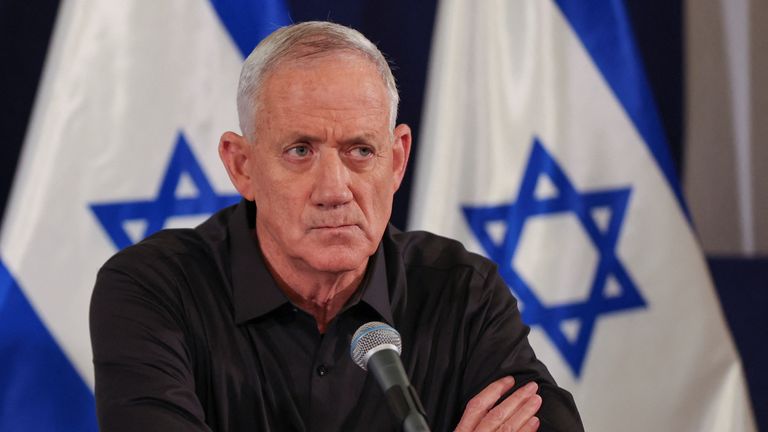
Benny Gantz, a popular centrist member of Israel’s three-member War Cabinet, threatened on Saturday to resign from the government if a new plan for the war in Gaza is not adopted within three weeks. This move could force Prime Minister Benjamin Netanyahu to rely more on his far-right allies.
This announcement highlights a growing divide within Israel’s leadership, over seven months into a conflict that has yet to achieve its goals of dismantling Hamas and recovering the numerous hostages taken during the militant group’s attack on October 7.
Gantz proposed a six-point plan that includes the return of hostages, ending Hamas’ rule, demilitarizing the Gaza Strip, and establishing an international administration of civilian affairs with cooperation from the U.S., Europe, Arab countries, and Palestinians. He also supports efforts to normalize relations with Saudi Arabia and expand military service to all Israelis. He set a deadline of June 8 for these changes.
“If you choose the path of fanatics and lead the entire nation to the abyss, we will be forced to quit the government,” Gantz declared.
In response, Netanyahu accused Gantz of issuing an ultimatum to the prime minister rather than Hamas, dismissing his conditions as “euphemisms” for Israel’s defeat.
Gantz, a long-time political rival of Netanyahu, joined the coalition and War Cabinet early in the war as a gesture of national unity. His departure would make Netanyahu more dependent on far-right allies who oppose negotiations over a cease-fire and hostage release, and who advocate for the reoccupation of Gaza and the rebuilding of Jewish settlements there.
Gantz’s comments came shortly after Israeli Defense Minister Yoav Gallant, the third member of the War Cabinet, stated he would resign if Israel decided to reoccupy Gaza. Gallant also urged the government to plan for Palestinian administration of the enclave.
Critics of Netanyahu accuse him of prolonging the war to avoid new elections, a charge he denies. Polls suggest Gantz could replace Netanyahu in an election, which would expose Netanyahu to prosecution on longstanding corruption charges.
“The people of Israel are watching you,” Gantz said in his prime-time address to Netanyahu.
Netanyahu faces increasing pressure from multiple fronts. Hard-liners push for continued military action in Gaza’s southern city of Rafah, while the U.S. and other allies warn against the offensive due to the humanitarian crisis. U.S. National Security Adviser Jake Sullivan is visiting Saudi Arabia and Israel to discuss the war and is set to meet with Netanyahu on Sunday.
Many Israelis, frustrated by the hostage situation and accusing Netanyahu of prioritizing politics, demand an end to the fighting and the return of the hostages. Recent military findings of hostages’ bodies have intensified these frustrations, leading to protests for a cease-fire and new elections.
The latest cease-fire talks mediated by Qatar, the United States, and Egypt have yielded little progress. Hamas’s October 7 attack killed 1,200 people and took 250 hostages. Israel reports around 100 hostages still captive in Gaza, along with the bodies of about 30 others. The conflict has resulted in over 35,000 Palestinian deaths in Gaza, according to local health officials.
Gantz supports Netanyahu’s calls for the return of hostages and ending Hamas’s rule but proposes an international administration for Gaza, ruling out long-term Israeli occupation. Netanyahu insists on maintaining security control over Gaza and partnering with local Palestinians not affiliated with Hamas or the Palestinian Authority.
In March, Gantz’s discussions with U.S. officials in Washington earned Netanyahu’s rebuke, as Gantz was expected to leave the government after heavy fighting in Gaza subsides, signaling an end to the national unity established post-October 7.
Leave a Reply